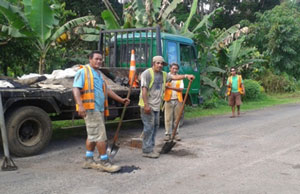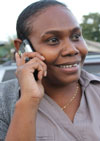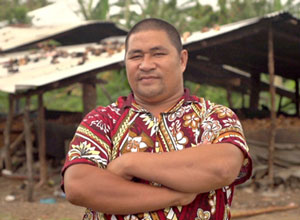Australia and the World Bank have assisted with the construction of new roads and road repairs in Samoa, which has helped connect people to key services like schools and hospitals. Photo: Corazon Alejandrino-Yap, PRIF
The Pacific is central to Australia's international development objectives. A quarter of Australian aid goes to the Pacific and Australian aid is half of all assistance received in the region.
Australia and the World Bank Group are together addressing challenges for the Pacific region, including natural hazards and climate change risks; economic policy; poverty and inequality; infrastructure and urbanisation pressures; and governance. Joint engagement in the Pacific region has significantly increased over the past few years.
Through Australian support, the World Bank has been able to scale up support to the Pacific to record levels. The World Bank is now an influential player in the region, bringing its wealth of technical expertise and experience from around the globe. In 2011–12, Australia provided $27 million to the World Bank for joint efforts in the Pacific. Australia and the World Bank work closely with other donors, particularly through the Pacific Region Infrastructure Facility, which coordinates activities for infrastructure in 12 Pacific island countries.
Solomon Islanders are benefiting from better telecommunications access and cheaper call costs thanks to support from Australia and the World Bank. Photo: Alison Ofotalau, World Bank
The partnership is bringing real improvements to the lives of Pacific islanders:
- In the past five years, more than two million people in Papua New Guinea and the Pacific have gained access to mobile telephones.
- Between 2006 and 2012, access to finance was provided to more than 500,000 people.
- More than 7,000 farmers in Solomon Islands received agricultural training between 2007 and 2011.
- In the past five years, more than 207 community projects, including schools, health clinics, solar power systems, bridges and water supply systems, have been developed in Solomon Islands.
- Since June 2010, more than 12,300 vulnerable people in Honiara have benefited from training and work experience.
A river runs through it
Roughly 85 percent of Solomon Islanders live in rural areas as subsistence farmers. Raising their standard of living is the focus of the Solomon Islands Rural Development Program, a joint Australia – World Bank initiative. This program focuses on improving infrastructure, providing essential agricultural support, and developing rural businesses. So far, more than 207 community projects have been completed or are under way, including building classrooms, health clinics, water supply systems and foot bridges, benefiting over 93,000 people. More than 7,000 farmers have received training, while 37 rural businesses have received finance that has led to a 30 percent increase in business turnover.
The Pirakamae River runs between the villages of Nambo and Pirakamae in Choiseul province. In the past, this has hindered access to vital services like schools, clinics, markets, and businesses, particularly during heavy rains when communities are cut off. Supported by community grants from the Rural Development Program, three footbridges have now been built. Children are now able to attend school without interruption and student numbers have tripled. Farmers, the sick, the elderly, expectant mothers, business people and the rest of the community have also benefited from this connection.
After the disaster: rebuilding post-tsunami Samoa
Samasoni is a local businessman in Samoa. The rebuilding of roads in Samoa following the 2009 tsunami played a vital part in re-establishing Samasoni's business and making his life easier. Photo: World Bank
Samoa is highly vulnerable to natural hazards. In September 2009, a powerful tsunami killed 143 people and destroyed thousands of homes [video, external website]. In the aftermath, many villages relocated further inland. A road was constructed with the help of Australia and the World Bank through the Pacific Region Infrastructure Facility, enabling communities to access services and local markets. The project also supported the construction of new sea walls along the destroyed coastline.
Samasoni is a local business owner who has relocated and rebuilt his home and business from scratch. 'The most pressing problem we faced in starting the business again in this new location was the condition of the road and no capital to start up the business again. So that's why we were looking for help', he said. 'The road to our present location has played a vital part in establishing our business and making life easier'.



